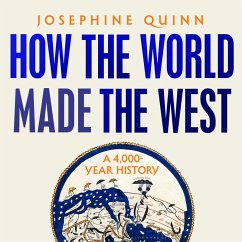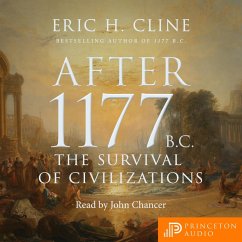
Rome Is Burning (MP3-Download)
Nero and the Fire That Ended a Dynasty Ungekürzte Lesung. 649 Min.
Sprecher: Telfer, John
Versandkostenfrei!
Sofort per Download lieferbar
17,99 €
inkl. MwSt.
Weitere Ausgaben:

PAYBACK Punkte
9 °P sammeln!
This gripping audiobook narrated by John Telfer provides an authoritative history of Rome's Great Fire and the lasting harm it inflicted on the Roman Empire According to legend, the Roman emperor Nero set fire to his majestic imperial capital on the night of July 19, 64 AD and fiddled while the city burned. It's a story that has been told for more than two millennia—and it's likely that almost none of it is true. In Rome Is Burning, distinguished Roman historian Anthony Barrett sets the record straight, providing a comprehensive and authoritative account of the Great Fire of Rome, its immedi...
This gripping audiobook narrated by John Telfer provides an authoritative history of Rome's Great Fire and the lasting harm it inflicted on the Roman Empire According to legend, the Roman emperor Nero set fire to his majestic imperial capital on the night of July 19, 64 AD and fiddled while the city burned. It's a story that has been told for more than two millennia—and it's likely that almost none of it is true. In Rome Is Burning, distinguished Roman historian Anthony Barrett sets the record straight, providing a comprehensive and authoritative account of the Great Fire of Rome, its immediate aftermath, and its damaging longterm consequences for the Roman world. Drawing on remarkable new archaeological discoveries and sifting through all the literary evidence, he tells what is known about what actually happened—and argues that the disaster was a turning point in Roman history, one that ultimately led to the fall of Nero and the end of the dynasty that began with Julius Caesar. Rome Is Burning tells how the fire destroyed much of the city and threw the population into panic. It describes how it also destroyed Nero's golden image and provoked a financial crisis and currency devaluation that made a permanent impact on the Roman economy. Most importantly, the book surveys recent archaeological evidence that shows visible traces of the fire's destruction. Finally, the book describes the fire's continuing afterlife in literature, opera, ballet, and film. A richly detailed and scrupulously factual narrative of an event that has always been shrouded in myth, Rome Is Burning promises to become the standard account of the Great Fire of Rome for our time.













